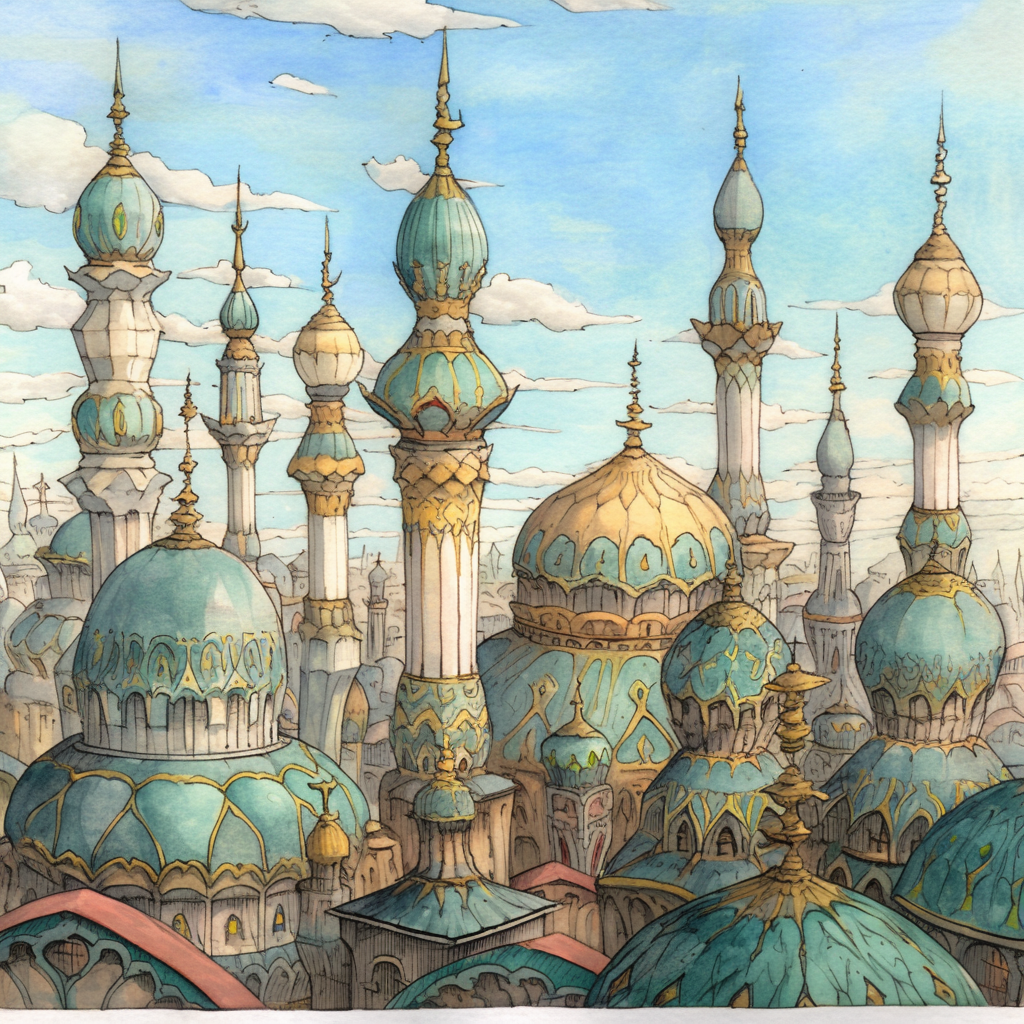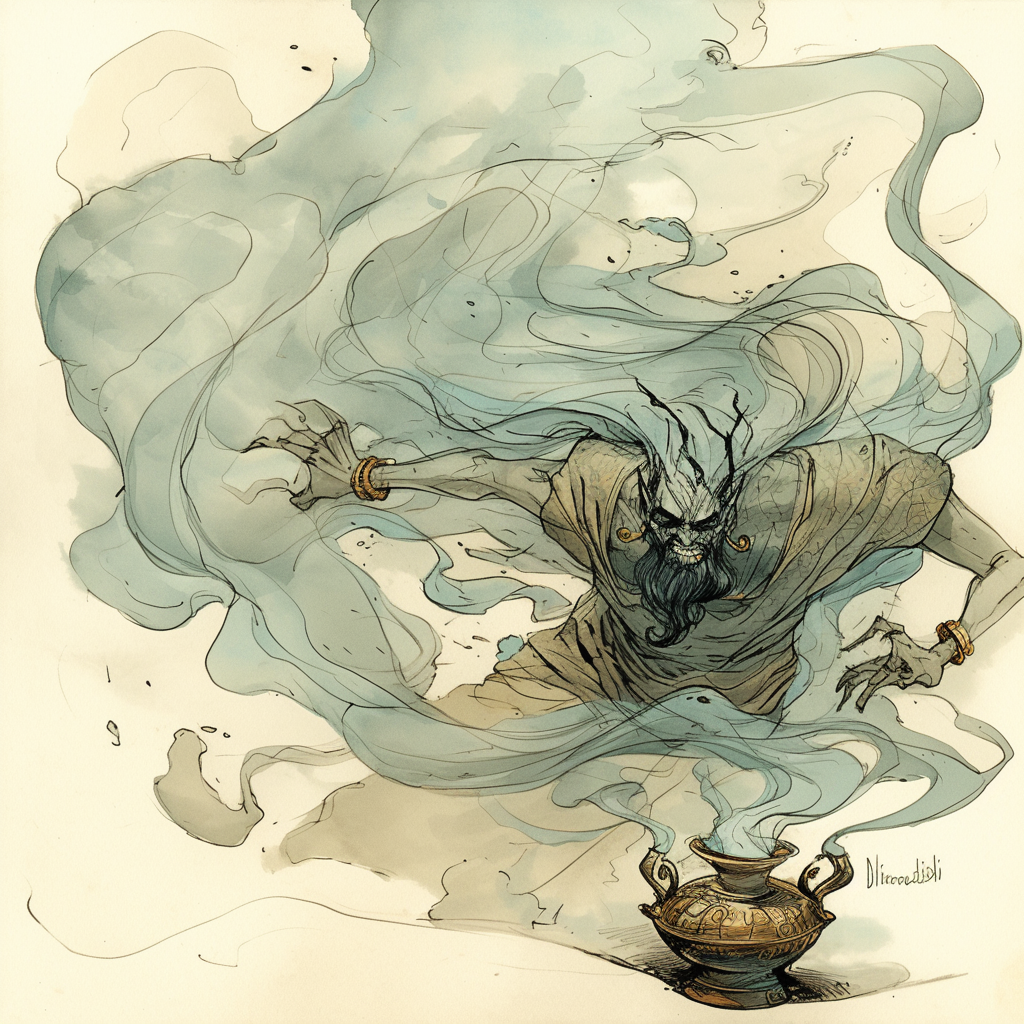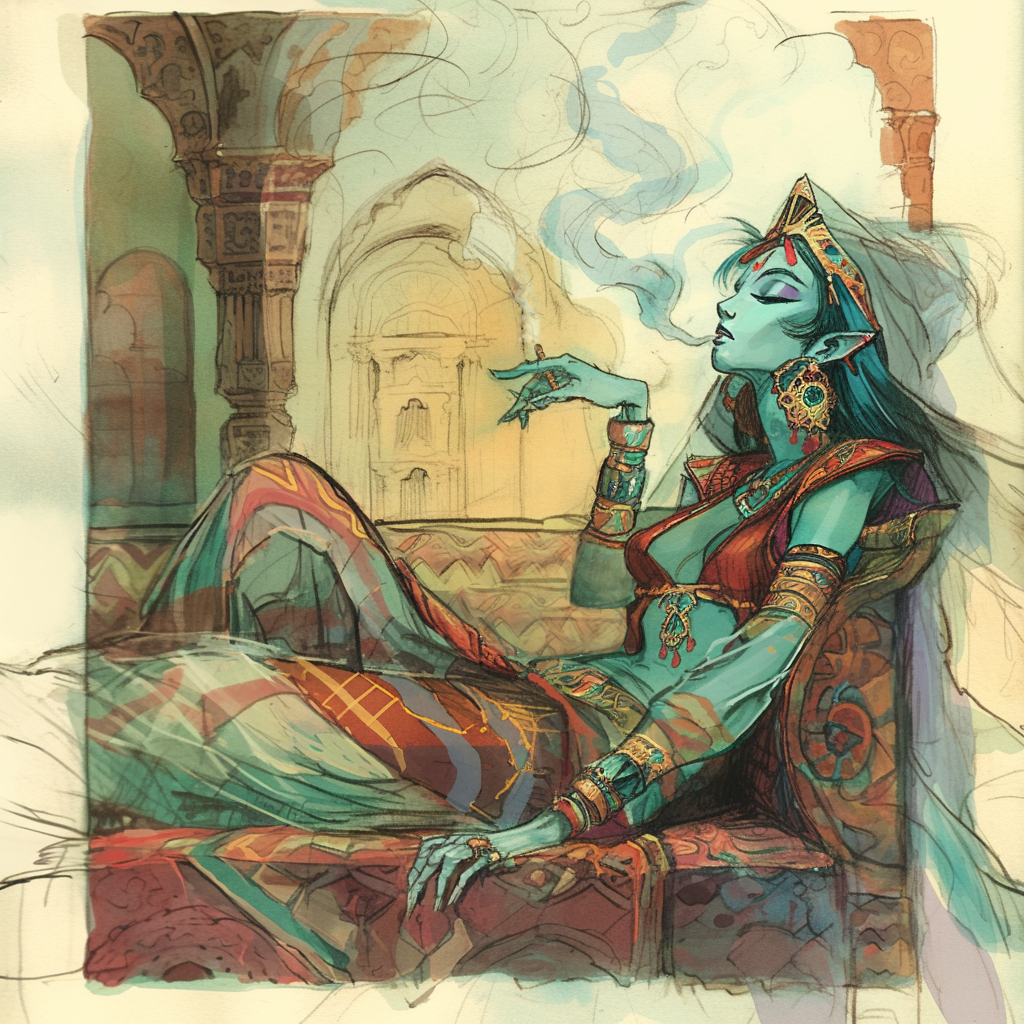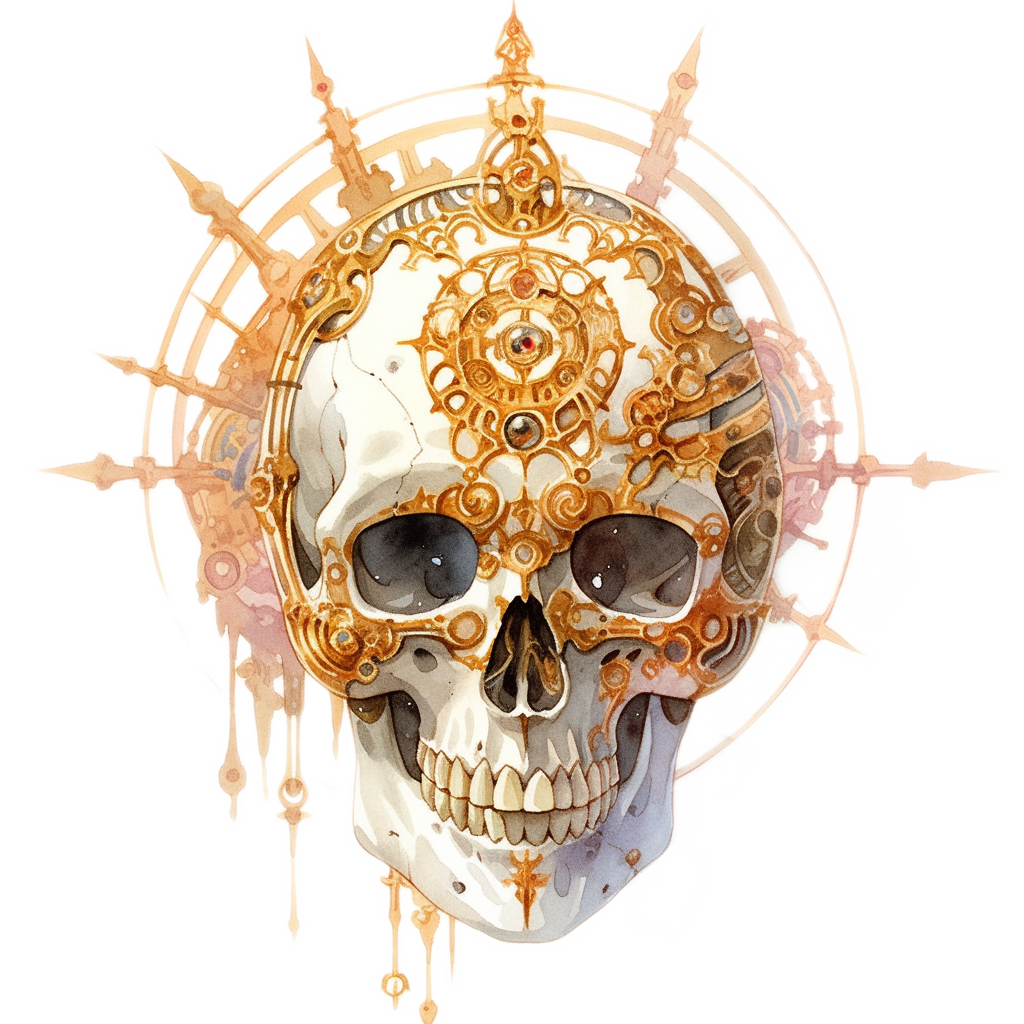Djinn

“Let me tell ye ‘bout the time I supped with a djinn prince in his sky-palace…
“We’d been lost in the Plane o’ Air for days—no ground, no sun, just endless sodding blue—when a storm-riddled cloud fortress loomed ahead. Out strides this giant with skin like polished silver, eyes cracklin’ like lightning bolts. He wore robes that flowed like liquid wind, an’ his voice? Thunder, with a smile. “Lost, little moth?” he boomed. “Caliph Zephyr invites you to dine.”
“Turns out the djinn love an audience. His palace? A floating earth-mote dripping with gardens where the flowers sang breathy songs. Servants—some were air elementals an’ some were freed slaves—flitted ‘bout with trays o’ honeyed lightning (tastes like cinnamon, burns like whiskey).
“Over thrice-roasted phoenix, Caliph Zephyr spun some tall tales:
“We rule the sky, but our true crown is freedom. Chain a djinn? Ha! We’ll bury your city in sandstorms ‘fore sunset.”
“That citadel yonder?” He pointed to a glacier-fort floating off in the distance. “Stolen from a tyrant wind-god. Now it’s ours—we moves it where we please, ‘cause why not?”
“His court was chaos: Nobles betting small kingdoms on dice games, poets duelled with riddles, an’ twice, a hurricane tore through the hall just for fun. I stayed for days, always welcome, always cheerful. Yet when an efreeti raiding party unexpectedly breached the gates? The Caliph snapped his fingers—and suddenly every drunk, prankster, an’ bard became a soldier. “We feud like cats,” he winked, “but cross our skies? We unite faster’n a baatezu legion.”
“Oh, an’ the wishes? The good Caliph laughed when I asked. “A noble’s curse: Three wishes we must grant if we be bound. So we twist ‘em—give a miser gold that melts at dawn. Poetic, aye?”
“Come morn, he gifted me a compass carved from solid cloud. “Remember, little moth: We djinn cherish freedom, but cross us? The sky itself becomes your foe.”
“We left wiser: Djinn ain’t just wish-granters. They’re kings o’ chaos, poets o’ tempests—and golden-hearted tyrants.”

Djinn: Masters of the Endless Sky
The djinn, genies born of the Elemental Plane of Air, are towering humanoids (often over 10 feet tall) with skin and hair mirroring the hues of wind and sky—ever-shifting blues, purples, grays, and silvers. Their forms blend elegance and elemental chaos: Some djinn have legs that dissolve into swirling dust or storm clouds, and their eyes crackle with lightning. They dress in flowing, diaphanous robes that ripple like storm fronts, and their voices carry the resonance tones of thunder.
The djinn call themselves the jaathoon, but unlike some of their other elemental genie brethren they’re relaxed about what name you use. Although ont thing you should try to get correct is when you say ‘djinni’ or ‘djinn’. Djinni is the singular form, and it can be used whatever the genie’s gender, while djinn is the plural.
Djinn Society

Djinn society is a complex snd chaotic layered hierarchy of alliances and feudal rule. The rulers of individual strongholds or palaces call themselves Viziers, Beys, Emirs, Sheiks, Sharifs or Maliks. Who knows which is which, but if you want to be a good guest you should figure out the correct title to use. The earthmotes of the djinn range from opulent pleasure domes to militarised citadels, and might contain hanging gardens fountains, stables for racing gryphons. These places are guarded by air elementals, who seem to be employed willingly. One thing the djinn value above all is freedom, and unlike some of their genie-kin brethren, slavery is anathema to these bloods.
More important in rank are the Caliphs, who rule small domains which cover multiple earthmotes, potentially a couple of days flights apart. These caliphates might look the same to planewalkers, but any native of Air can easily tell where the borders are, even though it might all just look like sky. A Caliph will have several Viziers reporting to them, and they are able to send messages between the remote settlements by fast-moving air elementals who ride the winds.
Most important of all is the Grand Caliph Husam al-Balil ben Hafhat al-Yugayyim, Ruler of All Djinn, Master of the Clouds, Son of the Breezes (etc.), the singular and supreme leader of the djinn. His domain is the Court of Ice and Steel, a spectacular palace with a long and storied history—it was stolen from an evil archomental, and now serves as the mobile capital of the race.
Djinn trace their origins to the Primordial Wars, where they emerged as spirits of storm and sky. Djinn are perpetually at war with efreet (fire genies) and dao (earth genies), while though they trade cautiously with marids (water genies). Some djinn descend to the Prime Material Plane to claim ruined cloud palaces or exploit mortal realms, often during times of political unrest.
Philosophy & Culture
Djinn value freedom, whimsy, and benevolence—but unlike the skies, their kindness is not boundless. Djinn hold freedom as the highest right, They despise confinement, whether physical (e.g. imprisonment in lamps) or societal. Enslaved djinn often seek poetic vengeance on their captors. Fond of illusions and pranks, djinn love to reshape reality for their own amusement but avoid lasting harm with their mischief. While they keep servants, djinn typically treat their underlings with relative dignity—they see themselves as protectors, not tyrants.
Djinn have a strong affinity with storms, and their tempestuous moods are able to alter the local weather—calm breezes precede balmy feasts; thunderstorms signal fury. They traverse the Inner and Ethereal Planes freely, often visiting giants in cloud cities or the Material Plane’s deserts. They can turn invisible at will, and change shape into the form of a bird. Some jaathoon are able to manipulate the dreams of sleeping mortals, sending nightmares or visions of the sleeper’s future.
Noble djinn—approximately 1% of their population—can grant three wishes to anyone to whom they owe a debt, though they loathe such servitude, and will typically try to twist the wish into a mischievous outcome. In essence, djinn are paradoxical sovereigns: They are regal yet wild, generous yet mercurial—and crossing one is like gambling with a lightning bolt.
Canonical Sources: Monstrous Compendium Vol. 2 [2e] stats; Monster Core [PF 2e] p157 stats (as jaathoon)
Source: Jon Winter-Holt




Did you mean Sheriff as in like a Sherriff officer or Sherif/Sharif as the arabic title?
I meant sheriff as in the typo that I clearly copied out of the original AD&D monstrous compendium entry without realising! Thanks, I’ll amend to sharif to make it clearer!